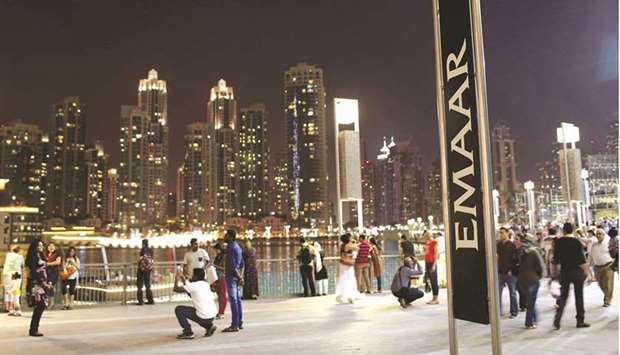Betting on Dubai to deliver uninterrupted success as a tourism and entertainment hub is turning into a costly business for some stock investors.
For the second time in less than three months, one of the emirate’s leading companies said it will effectively delist one of its units for about two-thirds of its original public-offering price. Emaar Properties PJSC, which built the city’s iconic Burj Khlaifa tower, announced Tuesday it plans to buy back a 15% stake in its Emaar Malls PJSC unit at a 36% discount to the 2.9 dirhams a share at which it sold it in 2014.
The move has any number of repercussions for a market that’s struggling to sustain interest following a pandemic-triggered selloff last year that was exacerbated by Dubai’s status as a global travel hub. As well as depriving investors of exposure to one of the emirate’s strongest sectors, removing a $6.3bn company from the DFM exchange may simply drive away would-be buyers, both big and small, from future offerings.
“It could prove an impediment to companies looking to spin off small stakes of 10% or 15% as investors may shy away even if the stock is attractive,” said Mohamed Ali Yasin, the chief strategy officer at Al Dhabi Capital Ltd in Abu Dhabi. “Fears of minority shareholders not being protected will become a concern for international investors going forward” as well, he said.
Emaar’s decision is additionally worrying for investors because it comes so soon after a similar move from another of the emirate’s leading property developers. In December, government-controlled Meraas Holding LLC proposed taking DXB Entertainments private at a 33% discount.
Driving the delistings are sluggish trading, a slump in prices and liquidity, and a desire by companies to escape investor scrutiny in a falling market, according to analysts.
Emaar Malls, in which Vanguard Group Inc, Norges Bank, BlackRock Inc and Schroders Plc hold stakes, has tumbled about 50% since trading at an all-time high of 3.50 dirhams seven years ago. At the 2014 initial offering – the market’s biggest listing in seven years at the time – the unit’s valuation was about 25 times estimated price-to-earnings. The buyback plan announced on Tuesday values it at a 13-times ratio.
For Emaar Malls investors, it’s a bad time to sell “valuations-wise” as the company is expected to perform better once the recovery takes hold, especially with the world Expo exhibition coming up later this year, according to Yasin.
The Dubai Financial Markets Index lost 9.9% last year as the spread of Covid-19 all but halted travel and battered the emirate’s businesses. That compared with 16% gains for both the S&P 500 Index and the MSCI Emerging Markets Index.
Emaar Properties said the deal would value the entire business at 24bn dirhams ($6.5bn). According to Bloomberg calculations, the offer is worth 1.85 dirhams per Emaar Malls share, a premium of about 10% to the stock’s Tuesday close. “Even though we think the offer will be accepted by the minority shareholders of Emaar Malls, the low premium offered and the discount to the IPO price may not be welcomed by investors,” Mohamad Haidar, an analyst at Dubai-based Arqaam Capital, wrote in a research note.

People have their pictures taken near an Emaar sign outside the Dubai Mall (file). Emaar Properties, which built the city’s iconic Burj Khlaifa tower, announced on Tuesday it plans to buy back a 15% stake in its Emaar Malls unit at a 36% discount to the 2.9 dirhams a share at which it sold it in 2014.
